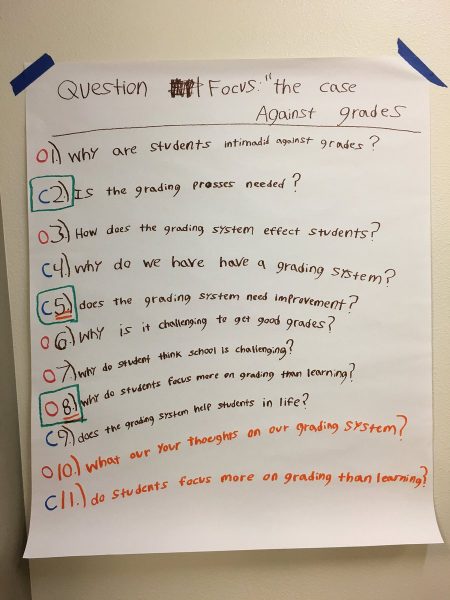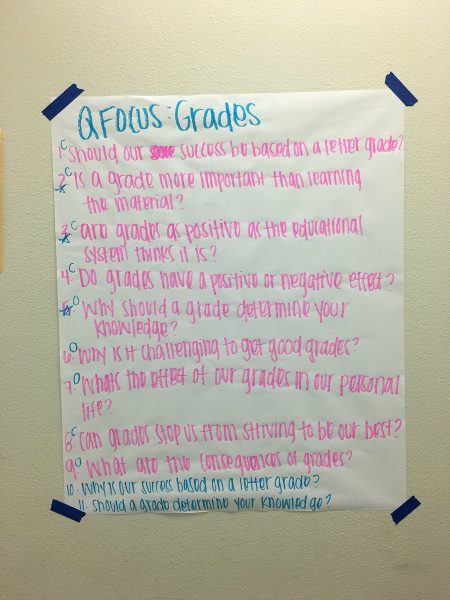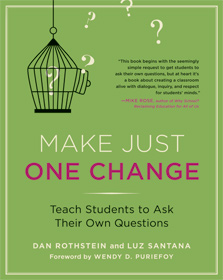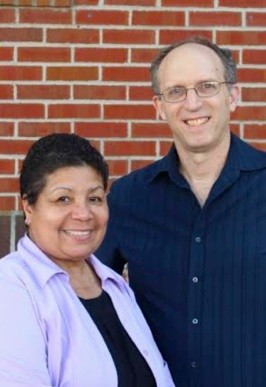About 25 miles east of Los Angeles is Mt. San Antonio College, one of the largest community colleges in the state of California. Mt. SAC, as it is affectionately known as, has a diverse student population (~55% Latino, ~19% Asian, & ~11% White/ Non-Hispanic). The majority of students receive some financial aid (~75%) and most attend part-time (~53%). Not only does Mt. SAC offer a wide range of degrees and certificate programs, but also it is consistently one of the top ten schools in California for transferring students to four-year colleges and universities.
In 2016, a Professor of Writing at Mt. SAC, Sun Ezzell, stumbled across information on the Right Question Institute’s summer Seminar on Best Practices in the Question Formulation Technique (QFT). Professor Ezzell was intrigued—she was eager to attend and learn how she could help to create a classroom environment in which students learn to ask more questions and better questions. She attended the seminar and left energized and ready to implement in one of her summer courses. Ezzell was thrilled with the results after her very first use, Tweeting, “Yesterday a student who hadn’t said a word all summer led his group in identifying open and closed Qs during the QFT process.” She used the QFT a few more times throughout the summer with much success, and students asked questions on human rights as they prepared to read Night by acclaimed author and thought leader Elie Wiesel, freedom of speech, women’s rights, education rights, and discrimination.
That fall in her writing fundamentals course, Professor Ezzell came up with a novel way to integrate the QFT for two different purposes. First, she planned to use the QFT so students would formulate their own questions to spark discussion on Alfie Kohn’s Educational Leadership article “The Case Against Grades,” and to write their response to the article using their questions as a guide. Thereafter, Professor Ezzell wanted students to consider for themselves whether they should switch from a letter grade to pass/ no pass for this course.
Designing a Question Focus
Professor Ezzell assigned the reading to her students as a homework assignment. As many professors and lecturers know, it is rare for an entire class to complete reading assignments as requested (and oftentimes there are legitimate extenuating circumstances in students’ lives that may prevent them from completing every assignment on time). Knowing that she would want all students to productively engage with the assignments and the thinking ahead regardless of whether they read or not, she crafted a clever workaround for the Question Foci.
Students who completed the reading would be presented with the statement, drawn from the title of the assigned reading: “The case against grades.” Students who did not complete the reading would receive a more simple one-word phrase that they could easily dive into: “Grades.” Her thinking was that all students have had experiences, both positive and negative, with grades and that their questions would fold in nicely with the questions other students who read Kohn’s piece would ask.
Introducing the QFT
As it was the beginning of the semester, Professor Ezzell walked students through all steps of the QFT, from introducing the rules, having them think about what may be difficult about following the rules, producing and working with their questions, prioritizing, and reflecting.
Producing Questions
As two groups, students asked questions about their respective Question Focus. Students’ questions tackled the statements from many different angles—student affect and feelings on grades, necessity, relevance to them, transferability beyond school, and quality of grading schemes. The questions are noticeably similar at times as both groups of students explored advantages and disadvantages of grades for their learning.
Group 1 Question Focus: The case against grades
 Why are students intimidated against grades?
Why are students intimidated against grades?- Is the grading process needed?
- How does the grading system affect students?
- Why do we have a grading system?
- Does the grading system need improvement?
- Why is it challenging to get good grades?
- Why do students think school is challenging?
- Why do students focus more on grading than learning?
- Does the grading system help students in life?
Group 2 Question Focus: Grades
 Should our success be based on a letter grade?
Should our success be based on a letter grade?- Is a grade more important than learning the material?
- Are grades as valuable as positive as the educational system thinks it is?
- Do grades have a positive or negative effect?
- Why should a grade determine your knowledge?
- Why is it challenging to get good grades?
- What’s the effect of our grades in our personal life?
- Can grades stop us from striving to be our best?
- What are the consequences of grades?
Categorizing Questions
First, students categorized their questions as either closed (can be answered with a “yes,” “no,” or with one word) or open-ended (cannot be answered with a “yes,” “no,” or with one word). Professor Ezzell had students reflect on the advantages and disadvantages of both types of questions. Then, students changed one closed-ended question to become an open-ended question, and one open-ended question to become a closed-ended question.
Click here to see the questions students changedQuestion 5 was opened to become: 10. What are your thoughts on our grading system?
Question 8 was closed to become: 11. Do students focus more on grading than learning?
Group 2
Question 1 was opened to become: 10. Why is our success based on a letter grade?
Question 5 was closed to become: 11. Should a grade determine your knowledge?
Interestingly, one new question as a result of changing questions was: “What are your (i.e. Professor Ezzell’s) thoughts on our grading system?” As students moved forward with the class discussion and writing assignment, Professor Ezzell was creating the space for students to pivot from thinking about grades from a traditional sense and worrying what others may believe, and think more for themselves about why grades may or may not be beneficial for their path ahead.
Prioritizing Questions
Each group selected their three most important questions.
Click here to see the questions students prioritized2. Is the grading process needed?
5. Does the grading system need improvement?
8. Why do students focus more on grading than learning?
Group 2
2. Is a grade more important than learning the material?
3. Are grades as valuable as positive as the educational system thinks it is?
5. Why should a grade determine your knowledge?
Again, it is striking to see how similar each group’s priority questions are, and this allowed Professor Ezzell to seamlessly move ahead with the lesson just as she anticipated.
Next Steps
Prioritization segued into students being assigned and talking about a writing assignment on the reading. For some students, asking questions helped them digest an article that has some academese. One student shared that, “I discovered that by asking questions about the article it was easier to understand the article and the meaning behind it.” Another student eloquently reflected, “I learned that by doing the question exploration it can help you not be stuck when you do not understand the material.” If Professor Ezzell had moved too quickly from students’ reading the article to assigning a reading assignment, or even perhaps if she had lectured the students on the substance of Kohn’s position, it is quite possible that students’ writing would have been less focused. Transitioning into the writing assignment, students found it was beneficial to think in questions as a way to debrief and to distill some of their own thinking and what they had learned from the piece.
As a class, the priority questions helped lead to a discussion about feedback and how they can use or share feedback to productively advance classroom learning. Professor Ezzell was able to better understand students’ thought processes on the topic. And, impressively, some students did indeed switch from letter grades to pass/ no pass—a decision that many students in higher education do not consider in depth if at all. Through reading the article, as well as asking questions and unearthing some of their own perspectives on the matter, students were able to think critically on the issue and make an informed decision as it pertained to their own circumstances.
Reflection
Students benefit when they are afforded space to reflect on what they learned and how they learned it. It allows everyone to compare what they know now that is different than when they started, and to identify for themselves their role in the process.
All students were asked to write on a piece of paper what they learned from the QFT. One student was floored by how equitable the experience was: “The [QFT] was an amazing group activity. I loved that no one was excluded.” Two other students discovered that they were thinking and learning in new ways: “I learned I can come up with questions very quickly which is good because it means thinking and creativity is improving and growing.” “When we come up with our own questions, we think more deeply.” Professor Ezzell also was able to glean how students perceived the exercise, what worked especially well, and how she might fine-tune the experience in the future.
College Classrooms Filled with Questions, Critical Thinking, and Collaboration
Professor Ezzell finds that, “it has been amazing to have students who experienced the QFT with me this summer take my other classes this fall. They are comfortable not just with the QFT, but they seem so comfortable collaborating with classmates, taking a leadership role in the class, and volunteering to share out from their groups. I can see so many ways in which they are growing and owning their learning in new ways like never before.” The skill of question formulation is one that benefits all learners, whether they are kindergarteners, high school students, students at a community college or four-year university, adult learners, or anyone regardless of their attaining a formal education.
Question formulation is a skill that can be developed and honed over time and as students continue to ask questions they become more proficient at thinking critically, analyzing text, and navigating new ideas. As Professor Ezzell notes, this can have a spillover effect: students learn that they have a voice in the classroom, work well with one another and invite collaboration, and help drive the learning process. Community college educators are in a unique position where they are working with students who potentially have different trajectories ahead, but by teaching a skill that is so widely applicable for learning and for life, Professor Ezzell was able to most effectively use the QFT as a part of her course offering.




I really enjoyed this article because it made me think tan with the FQT, I will be able to solve the problem consisting that some pupils do understand and other feel rejected from knowledge.